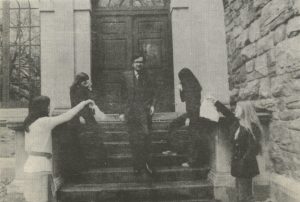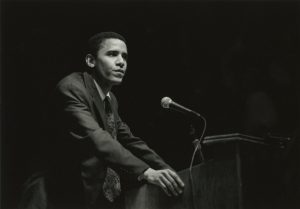The Dial’s Blast from the Past: Celebrating Black History month
On Black Power by Thomas E. Diggs Jr. ’69 from the February issue during the 1968-1969 school year
March 9, 2018
This issue’s Blast from the Past commemorates Black History Month, with an article written for the Dial by Thomas E. Diggs Jr. ‘69. Diggs served as school president his senior year and was among some of the first Black students Hackley admitted in the 1960s.
The first African student at Hackley was Louis Russ ‘53, the son of a Liberian diplomat. Despite the record suggesting that the student body was accepting of Russ, it states that he was self conscious about his race and ethnicity and was hesitant to socialize.
Russ was shortly followed by a group of African American students in the early 60s, with Malcolm Mooney Jr. being the first to graduate in 1962.
Diggs’ article expounds on the notion and significance of “Black Power” in “White America.” Diggs’ words still stand true today – while some might not consider issues of race to be as glaringly obvious, millions of Americans struggle with the concept of racial equality. February is a month in which we need to seriously consider America’s black history and reevaluate our actions (police brutality and mass incarceration of people of color to name a couple) as a country and an individual.
We must not only appreciate leaders like Martin Luther King Jr. and Malcolm X’s leadership, words, and bravery, but continue to act upon them. As a place where education and character are held at the utmost importance, remembering Black History is the first step out of many to ensure a more equal path for black Americans in the future.
*Editor’s Note: Readers should be advised that Diggs’ article contains racially charged language.
This country has fallen victim to a psychotic hysteria over the utterance of two simple words. The mentions of the words “Black Power” has put America into a frenzy.
Black Power, however, has several connotations, all of which are important. The one meaning most accepted by whites is that which stresses black owned businesses, black representation in government, and education, and black self-improvement. This interpretation stresses the fact that blacks want to do for themselves and rid their communities of white dominance in schools, government, and business. The results of this more conservative form of Black Power is the establishment of a black unity and identity, socio-economic and cultural.
There is a deeper meaning, however, which is supposedly a threat to white security. “Say it loud; I’m black and I’m proud” are the words that are echoing. Throughout the United States the black man has developed a sense of pride in his blackness as well as a new unity. Martin Luther King, whom I deeply respect, with all his sit-ins, marches, and peaceful demonstrations did not accomplish this. It took H. Rap Brown, Stokley Carmichael, and riots to awaken blacks and whites in America. It took this second meaning of Black Power. Blacks sat, sang, and marched for over two hundred years and could not accomplish this. The time has come to stop singing and start swinging. Patrick Henry said, “Give me liberty or death.” Paul Revere rode through the white community and said “Get a gun, white folks, the British are coming.” And all this came about over a few boxes of tea. Rap Brown said the same thing to the blacks. He was just as bitter as Patrick Henry and for a more worthwhile case; eyt he is condemned and called a traitor.
America is insane. Rioting is a form of Black Power, yet rioting is sad because it is self-destructive; but rioting in the form of the Boston Tea Party was not. However, two days after the Detroit riots, the Ford Motor Company hired over six thousand Negroes. Perhaps Mr. Ford doesn’t want his Mustangs scorched, but do you realize how long it would take to employ six thousand blacks using sit-ins, marches, and peaceful demonstrations? This was Black Power, Baby!
White America speaks of the progress the Negro has made; however, this is only an excuse to tell the blacks to behave themselves. After four hundred years the black man had to progress somewhat. Non-violence is a fraud. America only does what it has to do under the Constitution, which in itself is a fraud. White America has not changed in four hundred years, and it won’t unless blacks change it themselves. America must be pressured, for as soon as the pressure is relaxed, things will get worse.
The old Negro used to sit around telling stories. He was beautiful, peaceful, and patient. There was no pressure and the whites did nothing but say, “You’re a good boy.” That old black boy is bitter now, and he is the most dangerous person in the world. Black Power is telling it “like it is,” and he is acting “like he feels.”
But white America is her supreme hypocrisy refuses to understand this. America constantly talks about ridding the streets of crime. “Crime on the streets” is just another way of saying nigger.
Stokely once said that he did not want whites in the Civil Rights Movements any longer, and the press cried “reverse racism.” What’s reverse about it? Blacks have a right to hate; after all, they learned it from four hundred years of observation of the white. Nevertheless, nothing is racist about that statement. He was only saying he was tired of seeing all those northern whites coming down south with guilty consciences to annoy their rednecked white brothers down south. “All you have to do is take a Negro home with them, to their own parents. Then go back down south, and when you see redneck react, just remember your mama’s face. The same, aren’t they? Then maybe you’ll have a bit more compassion for your southern white brother.”
When the slaves were freed, the whites feared a full-scale revolution would occur on New Year’s day in 1866. It didn’t happen in 1886; it is happening now, in 1969. Wake up white America. Black Power is telling and showing and shouting it “like it is.”
White America, it’s your move! “No more water, the fire next time.”


